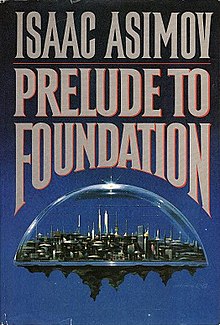Although this book by Isaac Asimov was written after completion of the original "Foundation series," the chronology of the stories would put this one first. I had never read this one and do feel it provides some excellent background to the award-winning series.
We meet Hari Seldon for the first time and come to understand the evolution of his thinking as the originator of psychohistory, which can predict the future. Hari, a talented mathematician, comes from a minor planet to give a paper on the theoretical proof for psychohistory at a conference on the Empire's capital planet of Trantor. Needless to say, even though his idea is still in the theoretical stage, many people would be most interested in being able to predict the future, including the Emperor. Seldom sincerely replies that psychohistory is not practical or do-able at this point in time and is summarily dismissed to return home. But before he can leave the Trantor, he is approached while eating lunch in a park by a friendly stranger, Chetter Hummin, who warns Hari that the Emperor will not let him go so easily. When Hari is attacked by a couple of thugs, he begins to believe the threat is real and accepts Chetter's offer to relocate him someplace safe while he continues to work on his theory. So Hari and Dors, a female historian from the university on Trantor who has been assigned by Chetter to bodyguard Hari, get moved around several times. Hari remains convinced of the impossibility of actualizing psychohistory without written records, but Chetter is equally convincing that without it, the declining Empire will soon disintegrate into Chaos for millennia. Based on historical research, Hari then decides that, if, as certain myths contend, some nearly human robots did exist at an earlier time, and if he can find one, the robot might contain enough data about civilizations and events for Hari to implement his predictive theory. In his search for a robot, Hari is continually getting into trouble with unfamiliar cultures, species, and customs and always getting rescued by either Dors or Chetter. Eventually, Hari finds a robot, but the real solution to his dilemma is his dawning realization that the complex social diversity on Trantor is enough of a foundation for him to move ahead with making psychohistory viable.
Although this book was really great for setting the context of the Foundation series, it was not a particularly compelling novel. Nobody can fault Asimov when it comes to brilliant forward thinking ideas, but the characters are not well developed enough to really make them likeable or detestable, and there is really very little plot. There is, however, a pretty nifty surprise ending.
We meet Hari Seldon for the first time and come to understand the evolution of his thinking as the originator of psychohistory, which can predict the future. Hari, a talented mathematician, comes from a minor planet to give a paper on the theoretical proof for psychohistory at a conference on the Empire's capital planet of Trantor. Needless to say, even though his idea is still in the theoretical stage, many people would be most interested in being able to predict the future, including the Emperor. Seldom sincerely replies that psychohistory is not practical or do-able at this point in time and is summarily dismissed to return home. But before he can leave the Trantor, he is approached while eating lunch in a park by a friendly stranger, Chetter Hummin, who warns Hari that the Emperor will not let him go so easily. When Hari is attacked by a couple of thugs, he begins to believe the threat is real and accepts Chetter's offer to relocate him someplace safe while he continues to work on his theory. So Hari and Dors, a female historian from the university on Trantor who has been assigned by Chetter to bodyguard Hari, get moved around several times. Hari remains convinced of the impossibility of actualizing psychohistory without written records, but Chetter is equally convincing that without it, the declining Empire will soon disintegrate into Chaos for millennia. Based on historical research, Hari then decides that, if, as certain myths contend, some nearly human robots did exist at an earlier time, and if he can find one, the robot might contain enough data about civilizations and events for Hari to implement his predictive theory. In his search for a robot, Hari is continually getting into trouble with unfamiliar cultures, species, and customs and always getting rescued by either Dors or Chetter. Eventually, Hari finds a robot, but the real solution to his dilemma is his dawning realization that the complex social diversity on Trantor is enough of a foundation for him to move ahead with making psychohistory viable.
Although this book was really great for setting the context of the Foundation series, it was not a particularly compelling novel. Nobody can fault Asimov when it comes to brilliant forward thinking ideas, but the characters are not well developed enough to really make them likeable or detestable, and there is really very little plot. There is, however, a pretty nifty surprise ending.

No comments:
Post a Comment